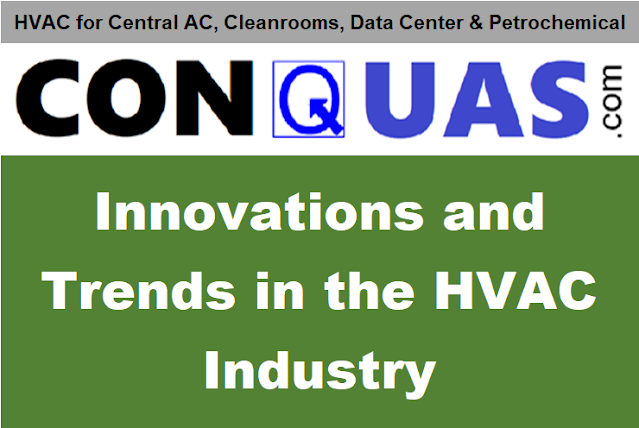Innovations and Trends in the HVAC Industry
Introduction
The HVAC (Heating, Ventilation, and Air Conditioning) industry is experiencing a rapid transformation, driven by technology and a focus on energy efficiency and indoor comfort. With intelligent systems, AI, and automation, HVAC is evolving to revolutionize how we use heating and cooling. This article delves into HVAC trends, shedding light on tech integration for enhanced performance, eco-friendliness, and user experience.
Table of Contents
- Understanding Intelligent HVAC Systems
- AI’s Impact on HVAC Performance
- Technology’s Influence on HVAC
- Enhancing HVAC Systems: Suggestions
- Recent HVAC Innovations
- Emerging HVAC Trends in 2023
- Automation in the HVAC Industry
- The Future of HVAC Industry
- Adoption Timeline for HVAC Innovations
Understanding Intelligent HVAC Systems
An intelligent HVAC system represents a blend of modern tech with traditional heating and cooling solutions. Such systems use sensors, data analysis, and AI algorithms to adjust temperature, airflow, and humidity in real-time based on conditions and user preferences. The aim is efficient comfort and lower energy use.
These systems are dynamic learners, optimizing performance by adapting to usage patterns and climatic variations.
AI’s Impact on HVAC Performance
Artificial Intelligence emerges as a transformative force, revolutionizing the industry. By intricately analyzing sensor data, AI adeptly anticipates potential equipment malfunctions, consequently fine-tuning energy consumption and upholding optimal air quality. A notable application involves AI’s capability to forecast HVAC component failures, effectively curtailing downtime and repair needs. Furthermore, AI continuously evolves through historical data, refining operational settings to attain pinnacle efficiency and substantial energy conservation benefits.
Technology’s Influence on HVAC
Technology is reshaping HVAC. Smart thermostats learn preferences, and building automation systems manage HVAC seamlessly with lighting and security. IoT devices allow remote control, while advanced materials lead to more reliable systems.
Enhancing HVAC Systems: Suggestions
Practical Recommendations. Leveraging renewable energy sources, such as solar power, presents an opportunity to significantly reduce carbon footprints while promoting sustainability. Furthermore, implementing advanced filtration systems holds the potential to greatly improve indoor air quality, a critical factor, especially within hospital environments where health is paramount. By harnessing AI-driven predictive maintenance, the industry can proactively avert breakdowns, thereby guaranteeing uninterrupted and reliable HVAC services.
Recent HVAC Innovations
Recent HVAC innovations encompass various fronts. Hybrid cloud automation centralizes HVAC management across locations, saving energy. Smart HVAC systems are integrating AI for precise climate control and energy optimization. Ventilation tech is advancing with air purification and pathogen detection capabilities, crucial in today’s health-conscious climate. Sustainable refrigerants are replacing traditional ones for reduced environmental impact. Additionally, decentralized HVAC solutions are gaining ground for increased flexibility. These innovations collectively mark a significant leap in efficiency, health, and sustainability within the heating, ventilation, and air conditioning industry.
Emerging HVAC Trends in 2023
In 2023, the HVAC industry is witnessing several emerging trends. Geothermal systems are gaining traction for their energy efficiency and consistent performance. Solar-powered HVAC solutions are becoming more prevalent, reducing reliance on conventional energy sources. The shift towards green refrigeration technologies is driven by environmental concerns. Smart thermostats and IoT integration continue to evolve, enhancing user control and energy savings. These trends collectively reflect the industry’s focus on sustainability, technology integration, and eco-friendly innovations.
Automation in the HVAC Industry
Automation in the HVAC industry is revolutionizing operations. Smart sensors and AI-driven algorithms enable real-time monitoring and adjustment of temperature, airflow, and ventilation. Predictive maintenance algorithms identify issues before they escalate, reducing downtime and costs. Remote control and monitoring enhance efficiency and convenience. Automation optimizes energy consumption, improving sustainability. As technology advances, automation’s role will continue to grow, making HVAC systems more responsive, efficient, and aligned with the demands of modern smart buildings.
The Future of HVAC Industry
The future of the HVAC industry is poised for remarkable advancements. Energy efficiency will drive innovation, with smart thermostats, IoT integration, and predictive maintenance becoming commonplace. Sustainable refrigerants and green technologies will gain prominence, aligning with the global push for eco-friendly solutions. Automation and AI will optimize system performance, while modular designs will simplify installation and repairs. The industry’s future hinges on a greener, smarter, and more interconnected approach to heating, ventilation, and air conditioning.
Adoption Timeline for HVAC Innovations
The adoption timeline for HVAC innovations is dynamic. Near-term advancements like smart thermostats and IoT integration are already widely embraced. Mid-term adoption will see increased integration of AI for system optimization and predictive maintenance. Over the long term, sustainable refrigerants and green technologies will become standard, driven by environmental concerns. Modular designs and automation will gradually gain traction, streamlining installation and repairs. The timeline reflects a progressive shift towards energy-efficient, interconnected, and eco-conscious HVAC solutions.
Conclusion
HVAC’s evolution is powered by technology, enhancing performance and sustainability. With intelligent systems and AI, HVAC is becoming smarter, greener, and more efficient, catering to both user needs and environmental concerns.
FAQ
- Q: What are recent HVAC innovations?
- Q: How does technology influence HVAC?
- Q: What are 2023’s HVAC trends?
- Q: Will HVAC be automated?
- Q: Where is HVAC headed in the future?
- Q: When will HVAC innovations be widespread?
A: Recent innovations include hybrid cloud automation and modular clean rooms.
A: Technology improves HVAC efficiency, controls, and materials.
A: Trends include energy-efficient systems and smart controls, Geothermal heat pumps, Solar powered air conditioning & Green Refrigeration.
A: Automation with predictive adjustments is a growing trend.
A: HVAC focuses on energy efficiency, sustainability, and tech integration.
A: Adoption varies; as technology matures, adoption increases.
#HVACTechnology #AIinHVAC #SmartHVAC #SustainableHVAC #HVACInnovations #TechTrends #FutureofHVAC #EnergyEfficiency

Leave a Reply